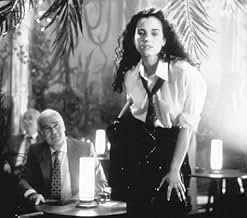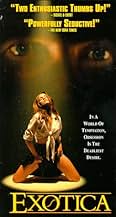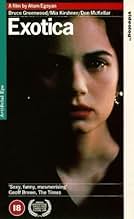A man plagued by neuroses frequents the club Exotica in an attempt to find solace, but even there his past is never far away.A man plagued by neuroses frequents the club Exotica in an attempt to find solace, but even there his past is never far away.A man plagued by neuroses frequents the club Exotica in an attempt to find solace, but even there his past is never far away.
- Awards
- 16 wins & 12 nominations total
Maury Chaykin
- Exotica Club Client
- (uncredited)
C.J. Lusby
- Exotica Club Dancer
- (uncredited)
Nadine Ramkisson
- Exotica Club Dancer
- (uncredited)
- Director
- Writer
- All cast & crew
- Production, box office & more at IMDbPro
Featured reviews
'Exotica' is clearly Egoyan's best film and his most successful presentation of the motifs that have characterized his films throughout his career; these include the presentation of the narrative out of chronological order, the interaction of characters by means of videotape and hidden surveillance, the relationship between parent and child, and the repetition of situation and dialogue. The film's theme involves the superficial barriers-both physical and psychological-that prevent people from making a genuine emotional connection with others; as we watch the film we witness how various people react to these barriers and struggle to break them down. The film's strong emphasis on structure and focus on Thomas' and Francis' parallel 'hunts' for human contact can't help but remind of that masterpiece of medieval literature 'Sir Gawain and the Green Knight' (this is a work that Egoyan was born to adapt to the screen). In my opinion each of the film's six major characters parallels another to compile three pairs. The first pair of characters is composed of Thomas and Zoe. The most obvious similarity between these two is that each owns one of the film's two principle locations. Thomas' pet store and Zoë's strip-club are comparable in that both are businesses whose principle merchandise is living creatures that are excessively displayed so as to persuade the customer to make a purchase. Moreover, while the pet store is lined with glass cages and fish-tanks, the walls of the strip-club are composed of two-way mirrors through which employees can secretly observe the customers. In addition to the life that each openly sells, both also possess hidden life. We see this in Zoë by the fact that she is very pregnant, but must disguise her appearance so as not to remind customers of the possible consequences of the lecherous behavior that her club encourages. Likewise, in the film's first scenes we see that Thomas is pregnant in a different way. Here, he is smuggling exotic bird eggs into the country by strapping the eggs to his stomach in order to hide them from Canadian customs officials. This hidden life also extends to their introverted personalities. To combat their inability to communicate verbally, both try to make interpersonal connections by means of physical contact. In a sense, then, Thomas and Zoë (as the Greek origin of her name might suggest) are givers of life both openly in their businesses and privately in their interaction with others. Next, Francis and Eric are parallel characters because of their mutual obsessions with Christina. Although Christina is intended to be seen as a sex object, neither Francis nor Eric has any interest in her in this regard. Instead, she symbolizes an emotional relationship that both once had, but now have lost. When they eventually discover their real relationship, Francis and Eric find that they do not need Christina and make an emotional bond with each other, which is symbolized by a physical embrace. Lastly, Christina and Tracey can be associated because Francis considers both as symbols of his dead daughter. However, Francis' relationships with Christina and Tracey both fail because he is unable to develop bonds that go beyond their assigned roles as a stripper and babysitter. Therefore, while Zoë and Thomas can be seen as givers of life, Christina and Tracey clearly receive life by taking on the roles that Francis and Eric impose on them. There are also many reoccuring images and symbols that reinforce the emotional isolation of the characters. The use of secret surveillance by two-way mirrors serves both as an invisible yet uncrossable boundary between people who would otherwise be very close to one another and as a way for the characters to make private judgments of those who are being unwittingly observed. In fact, while Eric secretly observes and judges Francis during his nights at Exotica, Francis, because of this job as an auditor, does the same to Thomas during the day. Egoyan reminds us that this relationship can ultimately be extended to include the audience members, who also make private judgments of the film's characters (we've this before in films like Hitchcock's 'Rear Window' and Powell's 'Peeping Tom'). As we watch the film, we too are in a sense reaching out to forge an emotional connection that transcends the barrier of the medium itself. The film's overriding presence of money suggests to the characters that the only legitimate grounds for a relationship is financial, and any time an emotional connection is made the characters feel guilty if they are not paying for it. Finally, the frequent appearance of parrots and their uncharacteristic silence reflects the characters' inability to communicate and overcome the losses of their past. I've really grown to admire this film and Egoyan's work in general. In 'Exotica' he creates a work of complex symmetry and interconnecting symbols while also conveying an atmosphere of lyrical intensity.
Atom Egoyan is a man who will soon win an Academy Award for Best Director in the next few years. After seeing The Sweet Hereafter, I rented Exotica, having heard that it's the best, if not his most signature piece of work- and WHAT a movie- this movie doesn't let you get away with falling asleep, loosing concentration, or anything like that. It makes you THINK, forces you to go scene by scene in a way that is utterly spellbinding. The nudity is a little shocking at first but dealing with its subject matter, for the 'art', so to speak, it's understandable. One of the best films of 1994, without a doubt.
The way that Egoyan intermingles different symbols, cuts back and forth through time, uses repeated imagery, and, at some points, holds back with severely limited dialogue, paints films that capture what it's like to live and remember and be alive. We watch the film, not knowing throughout the whole thing at least 80% of what the hell is going on during the scene, because we understand that the film is a kind of puzzle that'll be pieced together with time. That sense of unknowing- not knowing everything about the characters, not knowing everything, just yet, of what's happening- makes Egoyan's films, and certainly Exotica, some of the most mentally stimulately movies in cinematic history.
All in all Egoyan should of won Best Director in 1997, not Cameron, and this film definately deserved a best screenplay nod in 1994. I'll leave you with a potent piece of dialouge from the film, via Bruce Greedwood and Sarah Polley-
"Tracey- do you ever get the feeling that you didn't ask to be here on earth?"
"What?"
"I mean- no one ASKED that we be brought here. So the question is- who's asking us to stay?"
The way that Egoyan intermingles different symbols, cuts back and forth through time, uses repeated imagery, and, at some points, holds back with severely limited dialogue, paints films that capture what it's like to live and remember and be alive. We watch the film, not knowing throughout the whole thing at least 80% of what the hell is going on during the scene, because we understand that the film is a kind of puzzle that'll be pieced together with time. That sense of unknowing- not knowing everything about the characters, not knowing everything, just yet, of what's happening- makes Egoyan's films, and certainly Exotica, some of the most mentally stimulately movies in cinematic history.
All in all Egoyan should of won Best Director in 1997, not Cameron, and this film definately deserved a best screenplay nod in 1994. I'll leave you with a potent piece of dialouge from the film, via Bruce Greedwood and Sarah Polley-
"Tracey- do you ever get the feeling that you didn't ask to be here on earth?"
"What?"
"I mean- no one ASKED that we be brought here. So the question is- who's asking us to stay?"
Wanted to add a quick comment about this film because it took me by surprise. From the title and the late night TV slot I thought it was going to be something cheap and smutty, but nothing could be further from the truth. There's a lot of beauty and sadness in this film, beautifully filmed, full of thought provoking characters and the complexities of life, love and loss. The key relationship between Christina and Frank is played out with great sensitivity, but there's a great supporting cast. A film that is both gentle and surprisingly brutal.
Interesting opening credits. Interesting cast. Interesting use of Leonard Cohen's song. But in totality, just above average. The film deals with a set of characters, each having some sort of a psychological problem. Visually strong, but content-wise very weak.
This is my first Egoyan film. He has evidently some talent to make a viewer sit up and expect the unusual. But why populate an entire film with problem characters? That's not reality.
The most interesting bit was actor Don McKellar who plays Thomas is made to look like the director Atom Egoyan, complete with his glasses. Is that an autobiographical touch?
This is my first Egoyan film. He has evidently some talent to make a viewer sit up and expect the unusual. But why populate an entire film with problem characters? That's not reality.
The most interesting bit was actor Don McKellar who plays Thomas is made to look like the director Atom Egoyan, complete with his glasses. Is that an autobiographical touch?
10jon-88
Perhaps Atom Egoyan's most successful film. Egoyan's technique is to fracture a story like a jigsaw puzzle, giving the viewer bits and pieces which only all connect in the final scene. That ripping apart of reality is especially appropriate here, since the movie is about people putting their lives together after terrible trauma. It's also about the danger in leaping to conclusions - the viewer is often tempted to make a judgement about what he or she sees, and that judgement is often both wrong and unfair. If this all sounds like homework, be assured that the movie is also a lot of fun: it's sexy and interesting and inspired.
Did you know
- TriviaAtom Egoyan says that the film was inspired by three experiences: being taken to a lesbian club where women onstage performed as men; having a tax auditor suggest to him (incorrectly) that he was being cheated by a business partner; and realizing as a teenager that a friend was trapped in an incestuous relationship.
- GoofsIn one scene when Eric is talking with Cristina walking on the grass, you can see a microphone at the top of the screen.
- SoundtracksEverybody Knows
Performed by Leonard Cohen
Written by Leonard Cohen and Sharon Robinson
Published by Leonard Cohen Stranger Music, Inc. (BMI) and Geffen Music
Courtesy of Sony Music Entertainment (Canada) Inc.
- How long is Exotica?Powered by Alexa
Details
Box office
- Budget
- CA$2,000,000 (estimated)
- Gross US & Canada
- $4,221,036
- Opening weekend US & Canada
- $100,654
- Mar 5, 1995
- Gross worldwide
- $4,221,036
Contribute to this page
Suggest an edit or add missing content






































